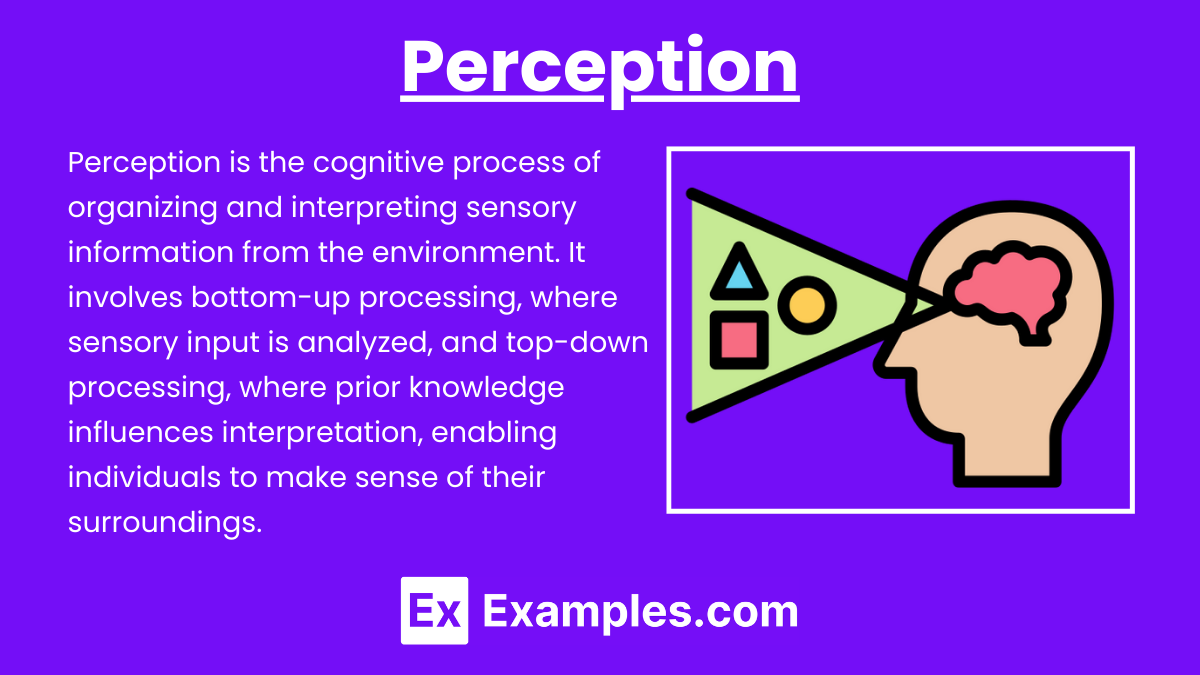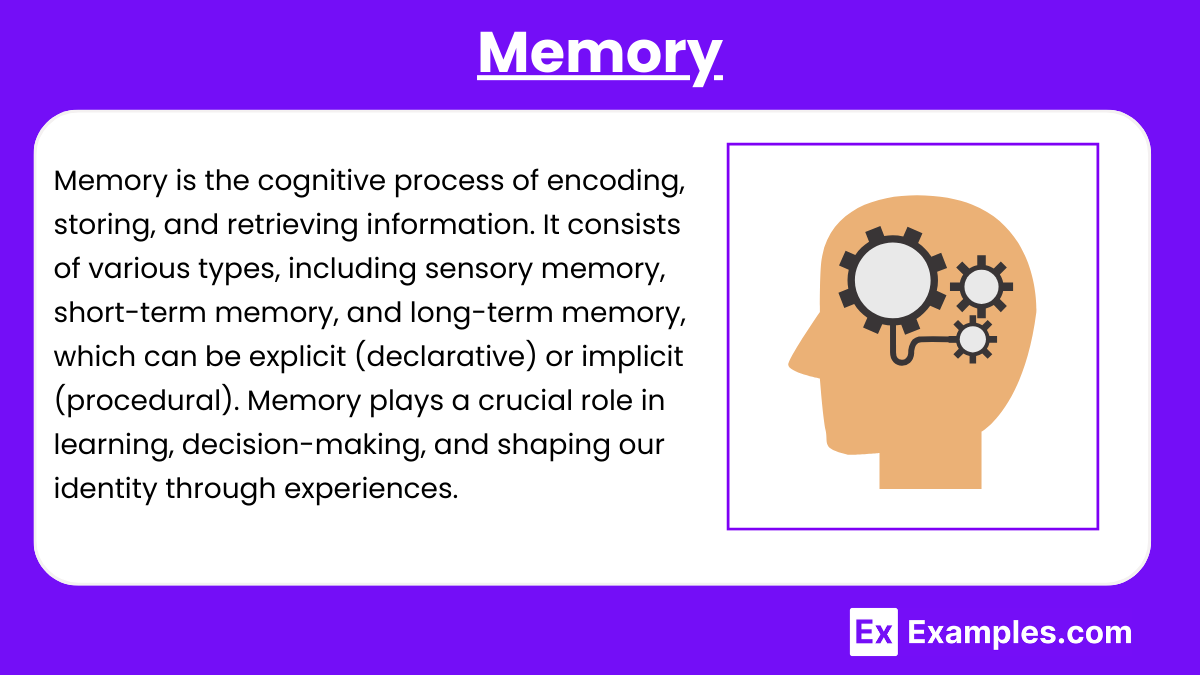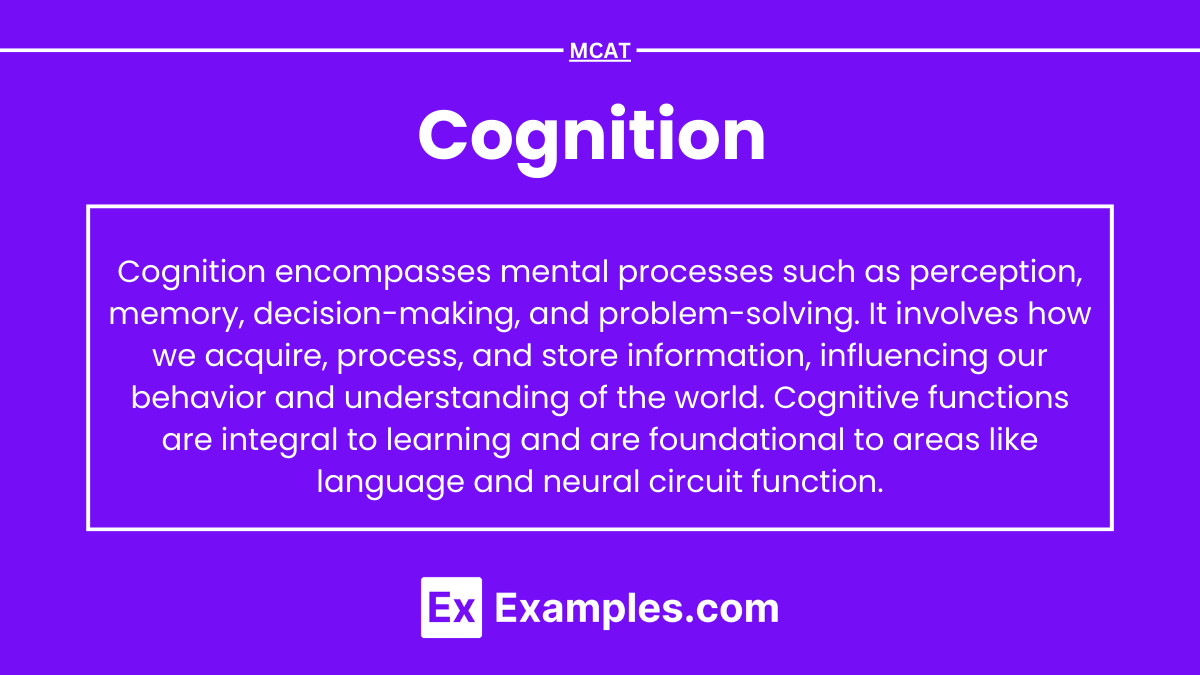Preparing for the MCAT necessitates a profound comprehension of cognition, essential for mastering Organ Systems. Understanding the mechanisms of perception, memory, and decision-making, as well as language processing, equips you with crucial insights into cognitive functions, vital for excelling on the MCAT and grasping complex mental processes.
Learning Objectives
In studying “Cognition” for the MCAT, you should develop an understanding of the mental processes involved in perception, memory, and decision-making, including the mechanisms of information processing and the integration of cognitive functions. Explore the roles of attention, memory systems, and the interaction between different cognitive processes. Evaluate how changes in cognitive functions facilitate learning and behavior. Additionally, understand how these cognitive phenomena are foundational to understanding neural circuit function and overall mental processes. Apply this knowledge to interpreting data from psychological experiments and solving MCAT practice questions on cognitive behavior and the impacts of pharmacology on cognitive functions.
1. Perception

Perception is the process of organizing and interpreting sensory information from the environment. It involves both bottom-up processing, where sensory input is analyzed for features, and top-down processing, where prior knowledge and experiences shape the interpretation of sensory data. Understanding perception helps explain how individuals make sense of their surroundings and how factors like attention and context influence this process.
2. Memory

Memory encompasses the cognitive processes involved in encoding, storing, and retrieving information. It is categorized into sensory memory, short-term memory (STM), working memory, and long-term memory (LTM). Long-term memory is further divided into explicit (declarative) memory, which includes episodic and semantic memory, and implicit (non-declarative) memory, which involves skills and tasks. Familiarity with the types of memory and their functions is crucial for understanding learning and retention.
3. Language

Language is a complex system of communication that includes phonology, morphology, syntax, semantics, and pragmatics. It plays a vital role in human cognition, enabling individuals to express thoughts, share knowledge, and build social connections. Theories of language acquisition, such as the nativist theory proposed by Noam Chomsky, emphasize innate abilities, while other theories focus on social interaction and learning processes. Understanding language development is essential for grasping cognitive processes related to communication.
4. Problem-Solving and Decision-Making

Problem-solving refers to the cognitive processes used to find solutions to complex issues, utilizing strategies like algorithms and heuristics. Decision-making involves choosing between alternatives, often influenced by cognitive biases such as confirmation bias and anchoring bias. Recognizing the differences between well-defined and ill-defined problems, along with understanding the frameworks for making decisions, is important for applying cognitive principles to real-world scenarios.
Examples
Example 1: Generation of a Cognitive Response
A person encounters a novel stimulus in their environment.
If the stimulus is significant enough to engage the individual’s cognitive resources, attention mechanisms are activated, leading to enhanced processing of the information. This cognitive engagement can initiate a series of mental responses, such as evaluating the stimulus and forming an appropriate reaction.
Example 2: Role of Memory in Learning
Maintaining knowledge after repeated exposure to information.
The process of encoding information actively consolidates memories, which can involve rehearsal and retrieval practices. This action helps restore and maintain the accessibility of learned information, ensuring the individual is prepared to utilize that knowledge in future cognitive tasks.
Example 3: Effects of Cognitive Load on Decision-Making
Increased cognitive load affecting task performance.
When an individual is faced with multiple complex tasks, their ability to process information effectively can be hindered. High cognitive load may lead to decision fatigue, where the quality of decisions declines due to overwhelming demands on cognitive resources.
Example 4: Summation Leading to Cognitive Engagement
A student receives multiple inputs while studying.
Temporal summation occurs when several pieces of information are presented in quick succession, cumulatively enhancing the student’s engagement and comprehension of the material. Spatial summation occurs when inputs from various sources combine at the same time to enrich the learning experience.
Example 5: Impact of Stress on Cognitive Function
Elevated stress levels interfere with cognitive performance.
High levels of stress hormones can impair memory formation and retrieval, negatively affecting the brain’s ability to function optimally. This can lead to difficulties in problem-solving and decision-making, highlighting the importance of managing stress for cognitive health.
Practice Questions
Question 1:
What primarily maintains effective cognitive function during complex tasks?
A) The influx of new information
B) The ability to ignore distractions
C) The integration of prior knowledge
D) The active engagement of memory systems
Answer: B) The ability to ignore distractions
Explanation:
Effective cognitive function, especially during complex tasks, is primarily maintained by the ability to ignore distractions. This selective attention allows individuals to focus on relevant information, enhancing their overall cognitive processing.
Question 2:
During the encoding of new information, what cognitive process directly follows the initial perception of that information?
A) Retrieval of prior knowledge
B) Consolidation of the memory trace
C) Distraction by competing stimuli
D) Application of cognitive heuristics
Answer: B) Consolidation of the memory trace
Explanation:
Following the initial perception of new information, the cognitive process that directly follows is the consolidation of the memory trace. This process involves stabilizing and integrating the new information into long-term memory, making it available for future use.
Question 3:
Which of the following factors would likely increase cognitive load during a learning task?
A) A clear and concise presentation of information
B) The use of familiar and relatable examples
C) The introduction of multiple, unrelated concepts simultaneously
D) The application of mnemonic devices
Answer: C) The introduction of multiple, unrelated concepts simultaneously
Explanation:
Introducing multiple, unrelated concepts simultaneously would likely increase cognitive load during a learning task. This overload can hinder the individual’s ability to process information effectively, leading to reduced comprehension and retention.


